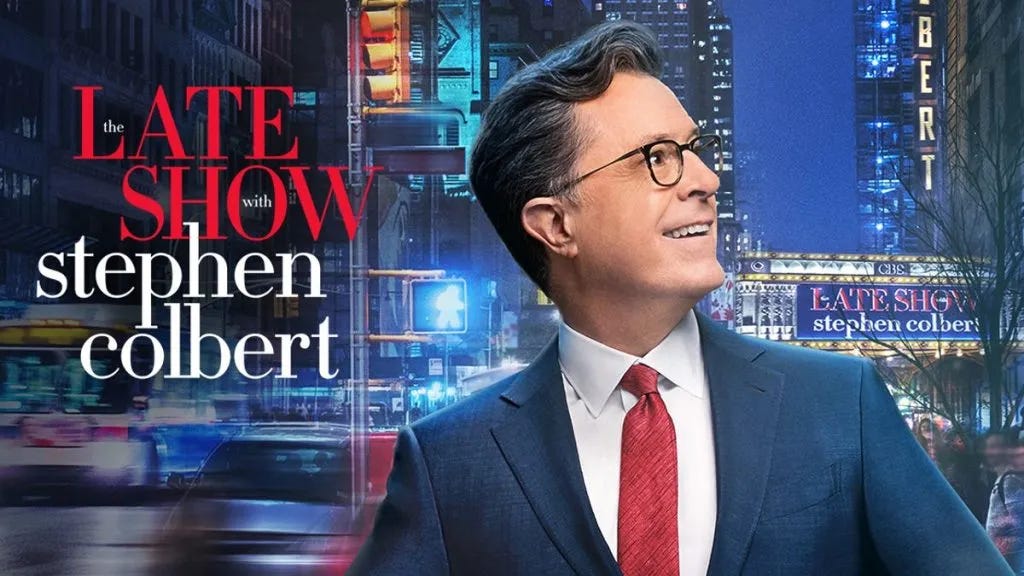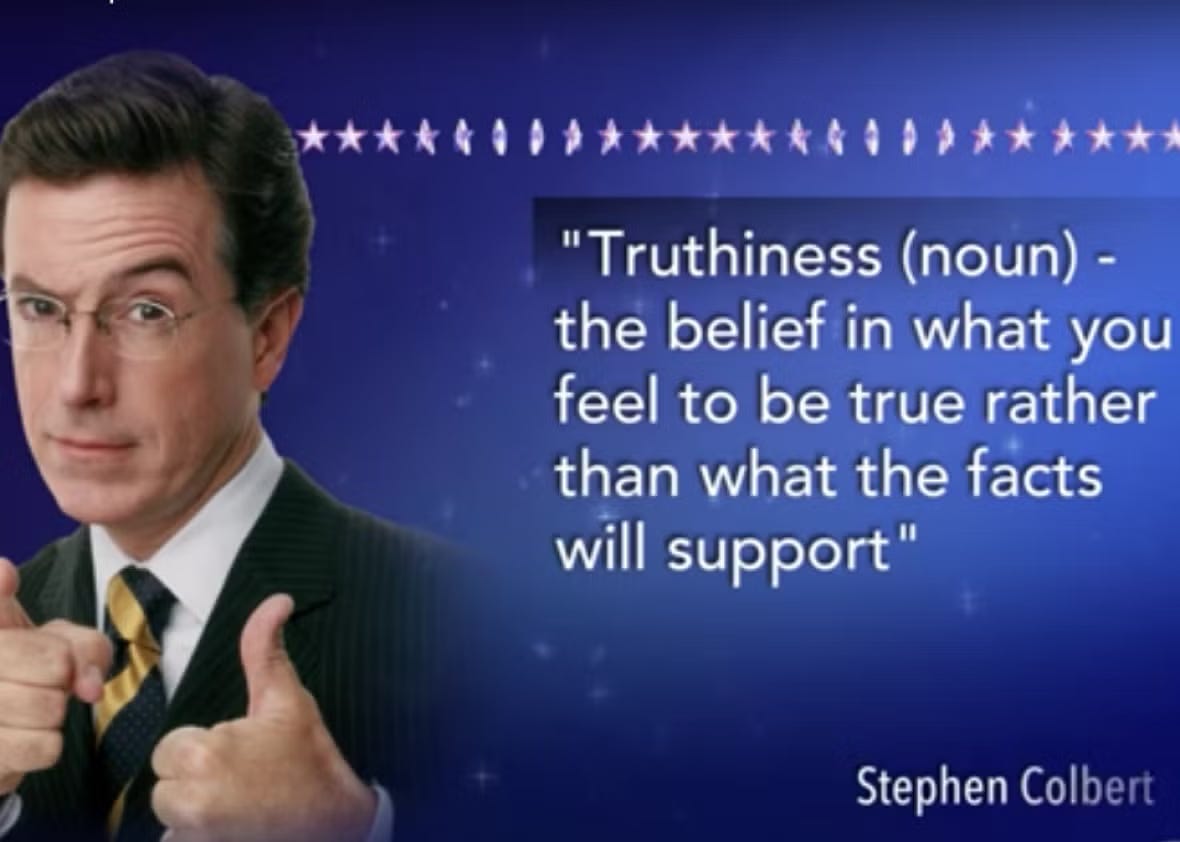Colbert, Wash Post and LA Times: Satirists and columnists under threat
There is a sad symmetry to recent events curtailing the work of columnists and satirists in America
I still remember how I learned to decode Fox News Channel by watching Jon Stewart on The Daily Show.
This was 20 years ago, back when Fox News tried harder to pretend it wasn’t a political operation designed to support Republicans and conservatives. MAGA didn’t exist then, but the Tea Party movement did, and Stewart – backed by a phalanx of ace correspondents, including Samantha Bee and Stephen Colbert – picked apart all the ways the channel put its finger on the scale for its preferred politicos, co-signing a fair amount of sexism and racism in the process.
And, of course, I loved how his confrontation of Tucker Carlson and Paul Begala on CNN’s Crossfire provided a passionate and (momentarily) effective pushback against the way disingenuously partisan debates on cable newschannels were harming American discourse.
That’s why I’m so concerned about CBS’ decision to cancel The Late Show with Stephen Colbert, along with moves by wealthy Trump supporters to curtail and control opinion writers at The Washington Post and The Los Angeles Times. Because satire and opinion are among the most effective ways to make connections for audiences and allow them to see trend in politics and society.
Controlling these areas of expression makes it easier for those who control the levers of power the society to exert their will. We have already seen attempts to intimidate journalists through legislation, legal and rhetorical pressure. But intimidating or eliminating those who help the public interpret what reported facts mean through satire and opinion is also another route toward squashing opposing ideas and stifling debate in society.
I spent all day Friday talking about Colbert’s cancellation on media outlets including NPR, WGBH, CNN, PBS’ NewsHour, the Canadian Broadcasting Corporation and MSNBC. In every appearance there was a healthy skepticism from news anchors about CBS’ claims they were walking away from Colbert’s show for purely financial reasons.
Why announce the May cancellation right now – when Colbert has 10 months to lambaste the network and use his current show to position himself for a post-CBS future? Why not try to work out a way to do the show cheaper? Or at least figure how to keep Colbert from going to a competing media company after The Late Show ends? CBS has spent 10 years building up Colbert as the comedy face of its network – walking away from that in the space of a few days seems short sighted and unnecessarily abrupt.
Unless, of course, Paramount is also trying appease the Trump administration to get much-needed federal approvals for its sale to Skydance Media. Paramount has already settled a lawsuit with Trump for $16 million – controversy over issues connected to the lawsuit led two executives to quit CBS News. News outlets also reported that David Ellison, owner of Skydance, met with the current, Trump-appointed FCC chairman earlier this week to push for those deal approvals, saying in a filing that Ellison “discussed Skydance’s commitment to unbiased journalism and its embrace of diverse viewpoints.”
Unfortunately, what we’ve seen so far feels more like attempts to curtail opinions, not widen them. And not just at CBS.
Late night TV shows and their monologues have a long history in American media. At first, they were a way for audiences to catch up with events of the day – gentle jokes about politics and pop culture at a time before people carried devices that brought them the news every moment.
Pioneers like David Letterman and Conan O’Brien helped turn late night TV into a haven for young folks, eager for new forms of comedy most established shows wouldn’t touch. And then voices like Jon Stewart and Stephen Colbert turned their late night platforms into incisive homes for political satire – particularly insightful as the rise of Fox News fed the radicalization of the American right wing.
As I noted many times yesterday, I loved Colbert’s coining of the term “truthiness” in his very first episode of The Colbert Report on Comedy Central back in 2005. On that show, Colbert played a satirical version of a right wing commentator, who often insisted that because he believed something was true in his gut, it had to actually be true — even when data and evidence indicated otherwise.
And now we’ve reached a point where those voices are under threat, seemingly from wealthy owners of media platforms more focused on making money than protecting democracy.
There are lots of sound financial reasons why media owners might want to walk away from late night TV shows in general — viewership is down and ad revenues are shrinking as audiences turn from traditional broadcast and cable to streaming services. But shuttering late night shows at a time when such decisions look like suppressing important speech will bring long lasting damage. And it also throws away a genre which has fed a huge chunk of the American comedy system.
All eyes in the industry will likely turn to The Daily Show, another Paramount-owned TV show which has been critical of President Trump for a long time. Like Colbert, it just got an Emmy nomination as best talk show and has seemed revitalized under a system where Stewart hosts once a week and the correspondents take over the remaining days. Will Paramount walk away from their work, too?
At this moment, I think it’s important for audiences which care about this kind of commentary to keep supporting the satirists, columnists and pundits who create this work – even when those people are stuck working for leaders and companies not taking similar stands.
Sad as I am to see Colbert lose his platform, I’m eager to see what he does next. And hope his fans don’t lose hope and choose to follow him wherever his creative spirit takes him next.
Because in a time of political turmoil, it is the satirists and ethical columnists who can help people process what’s happening and decide how they really feel.





Decades ago, when I was the national news editor for the St. Petersburg Times and therefore in charge of providing our hundreds of thousands of readers with information on Watergate, I had a co-worker who had been a journalist in Washington back to Truman's years. He suggested this headline for the Watergate stories: Nixon Caught in Smelly Deal. It WAS apt, and what would have worked 50+ years ago is appropriate today, subbing "CBS" for "Nixon" -- with Trump lurking in the background.
Tiny Chef was also on a Paramount owned network like Colbert. Anyone else feel like The Tiny Chef Show was politically cancelled for being too ‘DEI’ since it featured vegan recipes, Rupaul, a disco ball in the kitchen, and many black voices calling in to dish with the chef.
It might be a weird conspiracy theory but something doesn’t smell right, that’s all I’m saying.